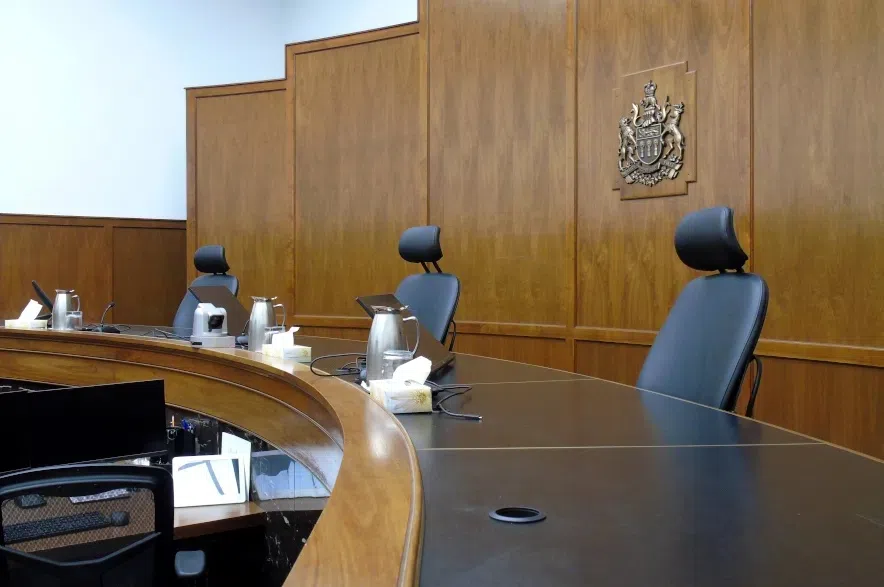A lawyer for Egale Canada was very happy with the decision that came down on Monday morning from the Saskatchewan Court of Appeal on the provincial government’s pronoun law.
In a 4-1 decision, the court largely ruled against the government’s appeals, allowing a challenge of the controversial law to proceed. The law, titled the Parents’ Bill of Rights, requires schools to get parental consent before changing the name or gender that a student 16 or younger uses in school.
Read more:
- Court of Appeal allows challenge to controversial Saskatchewan pronoun policy to proceed
- First Nations woman’s hair cut without consent at Saskatoon hospital, ombudsperson says
- Swift Current man critically injured after rattlesnake bite while golfing in Texas
“We were relieved and happy to see the decision,” said Bennett Jensen, director of legal at Egale Canada and co-counsel for UR Pride, which brought forward the challenge.
By rejecting the government lawyers’ arguments that the courts didn’t have jurisdiction to weigh in on the pronoun law because of the government’s use of the notwithstanding clause, Jensen said the appeals court upheld the position of the court system as a check on government.
“It’s not up to governments to decide whether they’re acting in a way that’s constitutional or not – our system sets that role as being with the courts,” said Jensen.
He said both sides agreed that the court wouldn’t be able to strike down the law, because of the use of the clause.
“It still really matters that a court considers whether or not the law violates the Charter, because the public has the right to know when a government is violating the Charter rights of members of society, especially when those members are vulnerable young people,” said Jensen.
As of Monday night, it was unclear what the next steps would be in the case.
In its response to the decision, the Government of Saskatchewan didn’t say whether it planned to appeal the ruling. Jensen said he and Egale Canada will be combing over the decision to determine what they would do next.
Jensen said he was most eager to get to the original question on the constitutionality of the law, and have the court weigh the substance of the issue.
“We really think that it’s important that the public understands why this law is so harmful,” he said.
“If you don’t know gender-diverse young people, you might not understand why having discretion with teachers to meet the needs of individual students is so important in this context.”
It’s been nearly two years since the pronoun law was passed and Jensen said there are people dealing with very real harm as a result of it.
“It’s easy to lose sight of the young people that are at the heart of this, but we’re talking about real consequences – very serious consequences in some cases – for young people, and I hope that that will be concerning to people the same way it’s concerning to UR Pride,” said Jensen.
Following the decision on Monday, the provincial government said it introduced the law to protect parents’ rights to be involved in their children’s education, and emphasized that it will always protect that right.
“The Parents’ Bill of Rights provides parents with the assurance that they will be involved in important decisions involving their children, and that important information involving their children will not be withheld from them,” read a statement from the provincial government.
In the wake of the decision, the Opposition Saskatchewan NDP called for the law to be repealed and for government to focus on other issues.
“The Sask. Party has wasted thousands and thousands of taxpayer dollars fighting this case in the courts, and today they were handed another legal defeat,” read a joint statement from NDP critics Nicole Sarauer, Jacqueline Roy and Nathaniel Teed.
A number of other groups weighed in on the decision as well.
The Saskatchewan Teachers’ Federation applauded the decision, saying the law puts teachers in a difficult legal position of either obeying the law or potentially having to put students in an unsafe situation.
“Along with the intervenors, we believe that Bill 137 inflicts harm on youth, and compels teachers and education workers to inflict said harm. Being allowed to move this challenge forward to the Court of King’s Bench is a positive step for gender-diverse students,” union President Samantha Becotte said in a news release.
CUPE Saskatchewan president Kent Peterson was also pleased with the decision, saying it ensures the courts can decide whether or not the legislation is unconstitutional, even when a government invokes the notwithstanding clause.
Ga Grant, a lawyer with the BC Civil Liberties Association – one of 11 groups granted intervenor status in the case – said what’s happening in Saskatchewan demonstrates the “terrifying shift in how the notwithstanding clause is being used in Canada.”
He said the clause had barely been used previously for fear of a public backlash, but now governments are using it to target vulnerable minorities, including young people.











